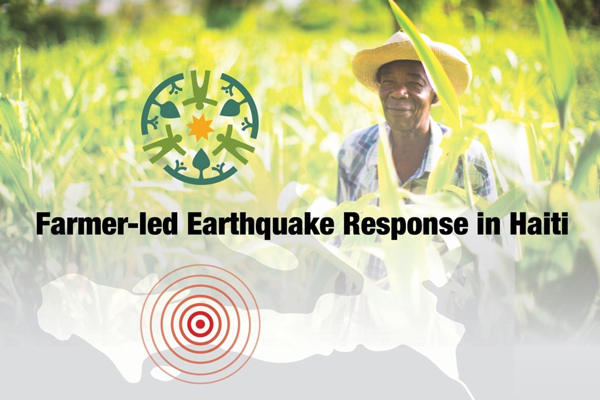In the wake of natural disasters, the resilience and tenacity of affected communities often shine through, urging global citizens to extend their solidarity and support. The recent earthquake in Haiti has elicited an impassioned response from the Bahá’í community, emphasizing a unique approach to recovery that is farmer-led. This article will explore the Bahá’í teachings that inspire such initiatives, elucidate the systematic methodologies employed in recovery efforts, and delineate actionable ways you can contribute to this vital cause.
Bahá’í teachings advocate for the oneness of humanity, emphasizing collective action and service to others. This fundamental principle not only calls for humanitarian assistance during crises but also encourages sustainable methodologies that empower local communities. The earthquake in Haiti has underscored the importance of local leadership, particularly in agricultural recovery efforts. By placing farmers at the helm of recovery initiatives, these efforts can address immediate needs while simultaneously reinforcing long-term food security and community resilience.
The following sections delve into the intricacies of farmer-led recovery efforts, highlighting their significance through the lens of Bahá’í teachings and illustrating how individuals worldwide can participate meaningfully in these endeavors.
Understanding the Context: The Impact of the Earthquake
In examining the effects of the earthquake on Haiti, it is imperative to recognize the existing vulnerabilities that were exacerbated by the disaster. The nation, already grappling with socioeconomic challenges, saw its agricultural systems significantly disrupted, affecting local food supplies and livelihoods. Essential infrastructure was demolished, and the ripple effects have left many farmers without resources to reboot their agricultural activities. In such a scenario, a paradigm shift towards a farmer-led approach can generate both immediate relief and long-lasting impacts.
Bahá’í Principles Paving the Way for Recovery
Central to Bahá’í teachings is the idea of empowering individuals to take initiative in solving their predicaments. This doctrine is inherently intertwined with the concept of agency, which fosters a sense of ownership and responsibility among community members. Therefore, a farmer-led recovery effort embodies this principle; farmers, being intimately acquainted with their land and its requirements, are ideally positioned to spearhead rehabilitative actions. The cooperative nature of such initiatives resonates with Bahá’í values of unity and collaboration.
Moreover, the Bahá’í faith underscores the importance of consultation. In recovery efforts, fostering dialogue among farmers, local authorities, and NGOs can yield innovative solutions tailored to specific community needs. This collaborative approach not only enhances project effectiveness but also cultivates unity and collective resolve.
Creating Sustainable Agricultural Practices
The cornerstone of any recovery effort lies in the sustainability of practices adopted. Farmer-led initiatives promote organic agricultural methods that are environmentally sound and socially equitable, thereby aligning with Bahá’í teachings that advocate for harmony with nature. Reintroducing native crops, employing permaculture techniques, and utilizing rainwater harvesting are exemplary strategies that can rejuvenate the land while safeguarding its biodiversity.
Furthermore, by engaging in education and training sessions, local farmers gain invaluable knowledge about sustainable practices. Workshops that focus on seed-saving techniques, natural pest management, and soil health can dramatically enhance agricultural output and facilitate a more resilient food system. It is through the dissemination of this critical information that communities can break free from the cycle of dependency commonly exacerbated by international aid mechanisms.
Microfinance and Economic Empowerment
In the intricacies of recovery, economic empowerment is imperative. The Bahá’í community often advocates for microfinance initiatives that provide farmers with the resources necessary to restart their ventures. By accessing small loans, farmers can invest in seeds, tools, and technology vital for agricultural production. Such financial assistance, coupled with sound agricultural education, ensures that farmers are not merely recipients of aid but rather active participants in their economic resurgence.
Furthermore, the establishment of cooperative societies can bolster this economic empowerment. These localized networks allow farmers to pool resources, share best practices, and enhance market access through collective bargaining. The cooperative model not only stimulates economic activity but also fosters a spirit of solidarity, aligning with Bahá’í principles of unity and collaboration.
How You Can Make a Difference
The roadmap to supporting farmer-led recovery efforts in Haiti begins with awareness and extends into actionable involvement. Below are several avenues through which individuals can contribute:
- Financial Donations: Contributing to organizations focused on farmer-led recovery efforts ensures that your resources are directed toward sustainable initiatives.
- Volunteer Work: Engaging with local NGOs can provide firsthand insights and opportunities to assist in training programs and community planning.
- Advocacy: Use your voice to advocate for policies that support sustainable agriculture and disaster recovery efforts.
- Education: Raising awareness within your community about the situation in Haiti and the importance of farmer-led initiatives can amplify the response significantly.
- Partnerships: Collaborate with farmers’ cooperatives or sustainable agriculture organizations to develop innovative solutions that can be replicated in Haiti.
The path forward may be fraught with challenges, but the underlying message of Bahá’í teachings, which focuses on the collective betterment of humanity, illuminates the way. By centering farmers in recovery efforts and supporting them with the necessary tools and resources, we can contribute to a cycle of renewed hope and resilience in Haiti.
In conclusion, the farmer-led earthquake recovery effort in Haiti stands as a testament to the power of community, empowerment, and sustainable practices. By embodying the Bahá’í principles of unity and service, we can participate in creating a better future for those affected, ensuring they have the means not only to recover but to thrive. Each action matters; join in fostering a brighter tomorrow.
